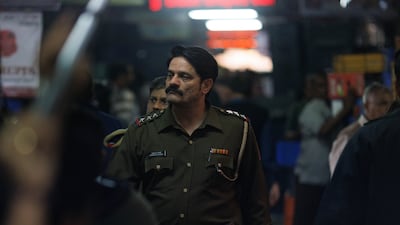In the stacked landscape of Indian dramas this decade, Paatal Lok has stood out for its unflinching look at society, and the invisible walls that demarcate us – whether by caste or class, by race or religion. A critical success when it was first shown in 2020, the series centres around small-time Delhi cop Hathi Ram Chaudhary (Jaideep Ahlawat), who's thrown into the deep end when a high-profile assassination-attempt case lands in his lap.
Through Hathi Ram's investigation, audiences found themselves engrossed in a richly woven world that's far from perfect but so vividly rendered that you couldn't look away. And by the end of the season, when our flawed protagonist and his accomplices eventually piece together the many puzzles they unearth, you're left wanting more – despite the trail of destruction and body count we have seen along the way.
Nearly five years after Paatal Lok premiered, writer and creator Sudip Sharma is taking things up a notch with season two, shifting the action to India's north-east, a politically charged region with its own set of unique issues, and very rarely accurately depicted on screen.
The season opens with the grisly murder of Jonathan Thom (Kaguirong Gonmei), a powerful politician from Nagaland state, who was in New Delhi to attend a business summit. It's soon revealed that Thom did not have the full support of some parties in his state, who accuse him of cosying up to the Indian government, possibly giving them a motive to kill him.
Elsewhere, Hathi Ram is given the case of a missing man, whose wife and young son refuse to leave his police station. He soon establishes a link between the missing man and Thom's murder, kicking off a dangerous cat-and-mouse game, expanding the Paatal Lok universe into a world few Indian shows or films have gone.

With its fragile political landscape and cultures starkly different from the rest of India, very few films and shows have been set in the north-east. And when they are, they've mostly spun one-dimensional narratives and stereotypical tales of exotic people prone to violence, hell-bent on taking up arms to fight for secession from India.
It helps that writer and creator Sharma was born in the north-east. Setting the story in Nagaland, a picturesque state rich in culture and with its own fraught politics, also lends perfectly to the kind of narrative edge on which Paatal Lok thrives.
Hathi Ram and partner Ansari (Ishwak Singh), his junior in season one who's now become his superior, arrive in Nagaland to investigate the link. They soon uncover a tangled web of political games, mixed with a thriving drug ring involving powerful businessmen in mainland India, and power brokers in Delhi desperate to extract everything they can from business opportunities opening up in a new region.

Ahlawat once again shines as Hathi Ram, a cop wary of the games he has to play to thrive in his job but who often cannot help himself when it comes to answering the call of duty. His camaraderie with Singh's Ansari remains electric, even if their power dynamics have shifted, secretly calling each other by their first names when they're alone.
Tillotama Shome as a no-nonsense police officer, Meghna Barua, charged with taking care of Hathi Ram and Ansari while they conduct their investigation in Nagaland, is brilliant and even nails the accent, while Nagesh Kukunoor, as an Indian bureaucrat with deep ties to Nagaland, who may or may not have the state's best interest at heart, is riveting to watch.

The show's setting also gives a number of north-east Indian talents the stage to shine, namely Naga rapper Lc Sekhose as Reuben Thom, Jonathan Thom's estranged son who becomes an unwitting pawn in the high-stakes power game. Comedian Merenla Imsong, who's also from Nagaland, excels in her role as a drug addict framed for the murder of Jonathan Thom, who goes on the run from both the authorities and the gangs who want her dead.
Sharma and his team of co-writers have done their due diligence, building a thrilling world of characters in a fresh setting. And, just like the first season, there are no didactic storylines, just a stark look at the very different worlds we exist in within our society, where trying to cross over to another often leads to deadly consequences.



